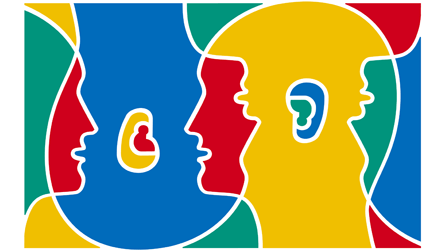Celebrating the European Day of Languages to encourage language learning
26th August 2019
The European Day of Languages takes place on the 26th of September. It celebrates linguistic diversity and promotes language learning.

The main objectives of this day are:
- raising awareness of the importance of language learning and diversifying the range of languages learnt in order to increase plurilingualism and intercultural understanding;
- promoting the linguistic and cultural diversity of Europe;
- encouraging lifelong language learning in and out of school, whether for study purposes, for professional needs, for purposes of mobility or for pleasure and exchanges.
The purpose of the European Day of Languages
There have never been more opportunities to work or study in a different European country, but lack of language competence prevents many people from taking advantage of them. The changing patterns of business ownership and globalisation illustrate the increasing need for foreign language understanding. English is no longer enough.
There are over 200 European languages spoken by both native speakers and citizens whose family origin is from other continents. Speaking different languages opens up so many new opportunities. We don’t just refer to employment here, but also to making new friends, contacts and showing respect to other cultures.
History of the European Day of Languages
The European Day of Languages was established in 2001, inspired by the concept of orchestrating a campaign aimed at persuading the general populace about the significance of expanding their language skills.
Following the success of the event, the Committee of Ministers of the Council of Europe decided that this day would be celebrated annually every September 26th.
The need for language learning in the UK
We have previously written an article questioning if Brexit will encourage foreign language learning.
Although foreign languages have been declining at A-level for some time, the most recent results show that for the first time ever, more English A-level students took Spanish than French, which has fallen in popularity since 2011 by 36%. The results also show that the number of pupils taking foreign languages this year has remained stable, which is promising to see.
While the number of students taking German has fallen by 41%, making some schools consider whether to drop it altogether, Spanish has risen in popularity by 15%.
Spanish, French and German are some of the most important languages, in terms of the UK’s future prosperity and global influence and their learning should be continuously encouraged.
Interesting Language FAQs
- There are around 7,000 languages in the world, spoken by 8 billion people, divided into 195 independent states.
- The majority of the world’s languages are spoken in Asia and Africa.
- Twenty-four official languages are spoken in Europe, while as many as 200 languages are spoken across the continent.
- Most linguists and experts believe that Euskera is the oldest living language in Europe. Euskara is spoken in Spain and France at the western edge of the Pyrenees. The origins of this language are unknown.
- At the very least, half of the world’s population are bilingual or plurilingual (they speak two or more languages).
- Although many languages have at least 50,000 words, we know and use only a fraction of the total vocabulary available. We also tend to use the same few hundred words in everyday conversation.
- Languages are constantly in contact with each other and influence each other in many ways. For example, English borrowed words and expressions from other languages in the past. The European languages are now borrowing many words from English.
- The mother tongue is usually the language one knows best and uses most. Nonetheless, there can be ‘perfect bilinguals’ who speak two languages equally well. Generally, however, bilinguals show no perfect balance between their two languages.
- Bilingualism has many benefits, it makes the learning of second languages easier, improves the thinking process and nurtures contacts with other people and their cultures.
- There are also economic advantages that come with bilingualism and plurilingualism. You may find it easier to find a job if you speak several languages.
- There are three broad groups of European languages belonging to Germanic, Romance and Slavic:
- The Germanic family of languages includes Danish, Norwegian, Swedish, Icelandic, German, Dutch, English and Yiddish, amongst others.
- The Romance languages include Italian, French, Spanish, Portuguese and Romanian, amongst others.
- The Slavic languages include Russian, Ukrainian, Belarusian, Polish, Czech, Slovak, Slovenian, Serbian, Croatian, Macedonian, Bulgarian and others.
- European languages use six alphabets. Although most of them use the Latin alphabet, other languages use the Cyrillic alphabet. Greek, Armenian, Georgian and Yiddish have their own alphabets.
- The non-European languages most widely used on European territory are Arabic, Chinese and Hindi, each has its own writing system.
- Russia has the highest number of European languages, between 130 to 200.
- Due to the open borders’ policy and influx of migrants and refugees Europe has become multilingual. In London alone over 300 languages are spoken.
Similar articles:
